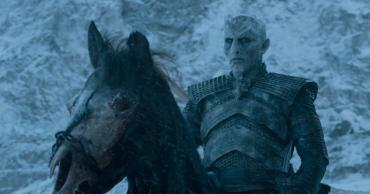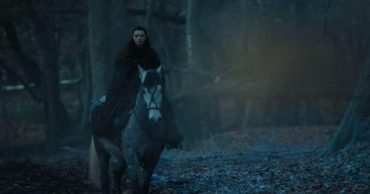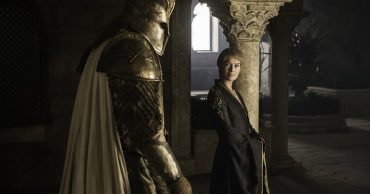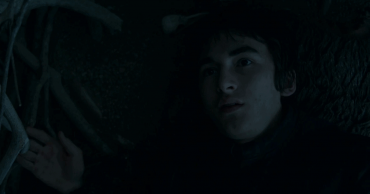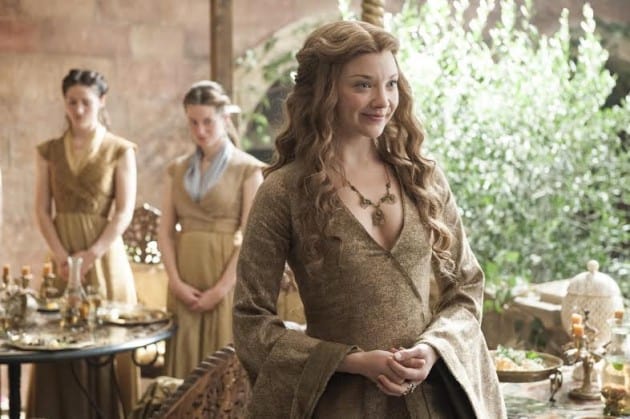
“High Sparrow” is best summed up by Littlefinger’s speech to Sansa as they stand outside Dreadfort. Littlefinger informs Sansa that she’s to marry Ramsey Bolton and avenge her family at Winterfell, and as she resists, he explains to her that she needs to “stop being a bystander” to history, as wars rage and the Stark family grows smaller and smaller. That idea of taking control of one’s destiny is a defining factor of “High Sparrow” – and the fifth season of Game of Thrones as a whole so far, which has primarily focused on characters attempting to take the reins of their own destiny, be it through decisive action, or faith in those guiding their journey.
For some characters – like the two Stark girls – that taking of the reins feels a little more hands-off than they might hope: both Sansa and Arya initially resist the new paths in life they’ve been given, determined to them by the people they’ve entrusted their maturity with, Ja’qaar and Petyr Baelish. Like the High Sparrow himself, they embody blind faith, the belief that following someone’s words and assumed actions is the path to self enlightenment. The result of this wildly varies of course: for every King Stannis following the light – in his case, literally – shone by others, there are characters as equally lost ideologically, like Poderick and Brienne, two people whose paths were determined by the kindness of powerful men.
The debate, however, doesn’t come between those embracing faith for the right reasons (Jon) or wrong (Cersei). The overarching conflict in “High Sparrow” is really between those of faith, and those of action. Sometimes, these agendas come in direct conflict with each other. Though there aren’t any interesting war politics happening in King’s Landing right now, the chess match between Cersei and Margaery continues to be a fascinating watch, as the Queen works her charms on her new husband, and Cersei seethes behind the scenes, watching as she’s turned into a foot note in a kingdom she still assumes to be her own (like Sansa and Winterfell, in a way). It’s always fun watching Cersei shoot lasers with her eyes around the capital; there’s an added bonus when we’re watching it in contrast with Margaery’s uncanny ability as a politician, both in social circles, political realms, and in the bedroom, where her influence over Cersei probably reigns the strongest (I mean she’s nearly convinced Tommen to send his mother to Casterly Rock; that takes some skill).
Outside of King’s Landing, these explorations of how people are embracing their new paths work in accordance with each other, conversations in one part of Westeros illuminating actions halfway across the Seven Kingdoms, which is really when Game of Thrones can make itself feel much smaller than it really is, therefore making much stronger connections between characters – and to the audience. The most obvious examples of this, of course, are Littlefinger/Sansa to Arya/Ja’qaar; however, “High Sparrow” uses another important emotion in building out the journeys it weaves together in this episode: vengeance, something that’s always a defining factor in the biggest moments and shifts in power in Westeros.
In the wake of the War of the Five Kings, many people are searching for vengeance. Brienne, Arya, and Cersei all find themselves operating outside of their normal lives to search for a path to revenge, a way to ease the bitterness and hatred they feel towards their enemies, and lost ones they’ll never have a chance to save. This, as always, is strongest with Arya as she tries to let go of Needle – “How does no one come to be surrounded by Arya Stark’s things?” – and become one of the proteges of the faceless men (who mostly clean dead bodies and sweep floors for some reason). However, “High Sparrow” benefits from the new found harmony Game of Thrones is building between all its storylines, giving important support to Brienne’s speech about her upbringing and Cersei’s conversation with the High Sparrow by tethering them to the show’s central emotional component.
It’s genius and helps elevate stories that are mostly stuck in limbo at the moment (Brienne and Cersei), while providing a backdrop for “High Sparrow” to explore the men of action, those forced into tough decisions that they desperately hope will give them the self-definition they seek. Bolton and Baelish find each other in their shared journey for self-definition, and Jon finds himself making a tough (though very easy) decision about Janos Slynt. Not only are these stories strong counterpoints to the scenes featuring characters of faith, but they give newfound agency to major and minor characters alike who’ve mostly existed as reactive forces to this point. Bolton makes a great point about how to solidify their house, but is a man who hangs up bodies of flayed skin the type who can execute such a plan? By the same token, Jon talks a big game about holding to his vows, even beheading a respected man for disobeying, but how long will he be able to maintain that integrity, especially if the spiritual leader of the Wall (Aemon, who is missing from the meeting because he is “sick”) may be leaving in the near future?
Although the first three episodes of Game of Thrones this season have been the least action-packed of the series, the show’s replaced it with a quality of writing and performance that more than makes up for the lack in visceral thrills. “High Sparrow” is another beneficiary of this, ramping up on the political games, while a few characters begin important existential journeys that could start to shape the next big crescendo for the series (a big one I haven’t mentioned: the Spider and Tyrion getting separated, the latter kidnapped by a disgraced Jorah to bring him back into good graces with Dany, one can presume).
Other thoughts/observations:
– I didn’t have a chance to highlight this above, but Tyrion’s scene in the brothel house was so beautiful – how Peter Dinklage conveys Tyrion’s deep, damaging pain about losing the woman he loved is such a powerful little moment, one that could be easily forgotten among the much more prominent, dramatic scenes of the episode with a lesser actor in the role. Simply brilliant.
– The High Sparrow, to Cersei: “I tell them that nobody is special, they tell me that I am special.”
– Davos could be a great salesman, couldn’t he? He does a great (if failed) job trying to convince Jon to join the fight in the North.
– A short wedding equals a deathless wedding.
– Tommen, about his rise to power being a product of his brother’s death: “I don’t feel guilty; that’s what’s odd.”
– “The North remembers.”
[Photo via HBO]
 Follow Us
Follow Us
